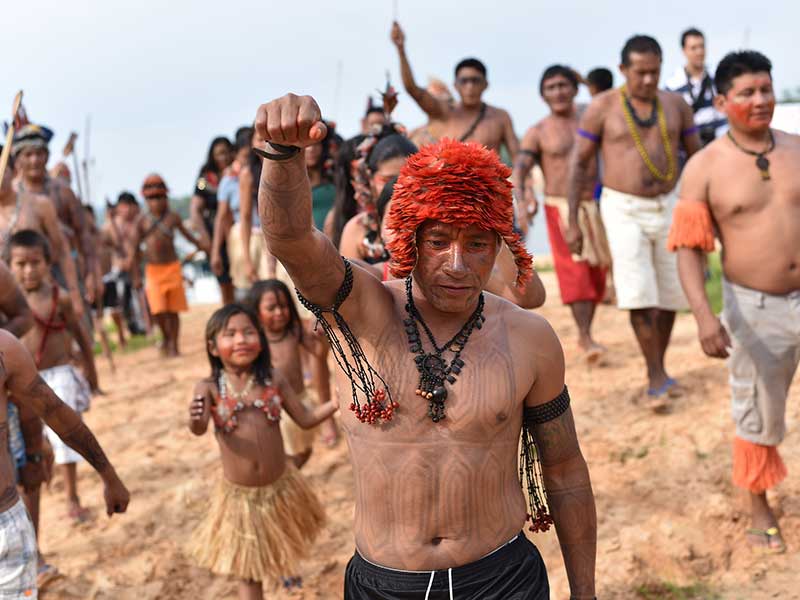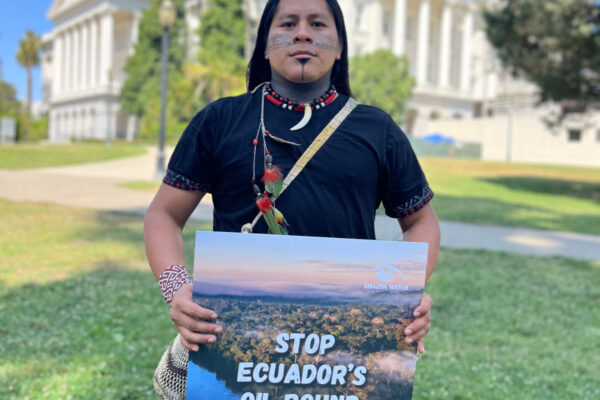
When Brazilian energy planners proposed to choke the Amazon’s Tapajós river and its tributaries with dozens of large hydroelectric dams, they underrated a formidable foe: the Munduruku people. The largest indigenous group in the Tapajós Basin, the Munduruku are proving to be sophisticated adversaries who are throwing a wrench in the dam industry’s plans.
The tribe has frequently caught the Brazilian government off guard with their tactics. With a flair for the theatrical – they staged a series of dramatic protests in Brasilia, including a “die-in” at the Ministry of Mines and Energy – and the practical. In January, they delivered a protocol to government officials demanding a culturally appropriate process of free, prior and informed consultation and consent (FPIC). (While enshrined in Brazil’s constitution and integral to ILO Convention 169, the indigenous right to FPIC has been systematically ignored.)
This month the fight goes international. Prominent Munduruku emissary Ademir Kaba will head to Geneva, where the United Nations will hold its 29th Human Rights Council (UNHRC). Ademir will deliver his people’s message to the UNHRC on June 24, accompanied by Prosecutor Felício Pontes of Brazil’s Federal Public Ministry (MPF). Pontes has co-authored dozens of civil action lawsuits on violations of human rights and environmental law surrounding the Belo Monte and Tapajós dam projects.
But as the tribe’s work bears fruit – they’ve forced energy planners to push back the timetable for Tapajós until 2016 – the government is resorting to ever more draconian measures. The use of a dictatorship-era legal mechanism known as “Security Suspension” (Suspensão de Segurança) allows it to arbitrarily overturn legal decisions that challenge dam projects, a tactic it disproportionately wields against the Munduruku.
The conflict comes at a bad time for Brazil, a nation currently angling for a permanent seat on the UN’s Security Council. The country is particularly sensitive to criticism at the international level given its reputation for leadership within the UN climate change convention (UNFCCC).
Previous criticisms of the government’s handling of the Belo Monte dam in 2011 resulted in aggressive denials of negligence and retaliatory measures. It remains to be seen whether the government will now take a more conciliatory approach given mounting evidence of human rights abuses and the social and environmental chaos resulting from Amazonian mega-dam projects.
Furthermore, as the Munduruku and other groups tenaciously defend their rights, the Brazilian government will find it increasingly tough to meet the rising challenge of defending its appalling record on indigenous rights on international stages.
More information:
- Tapajós Basin (International Rivers)
- Amazon Tribe Fights Brazil Dam Project (BBC News)
- Amazonian Tribe Take Initiative to Protect their Lands from Dam Project (The Guardian)
- Deciding How to Decide: the Munduruku Indigenous Group and political participation in Brazil (Open Democracy)
- We Will Fight To the End (Al Jazeera)
- Brazil Reverses Approval of Concession auction for 8,040-MW Sao Luiz do Tapajos Hydro Project (Hydroworld.com)
- Indigenous Alliance Demands Brazil Halt Amazon Dams
- Amazonian Tribes Unite to Demand Brazil Stop Hydroelectric Dams (The Guardian)
- Teles Pires Manifesto
- Brazilian Judicial Abuses Questioned on Anniversary of Military Coup
- Indigenous Leader Condemns Brazilian Government’s Rights Abuses at UN
- Decolonization and the Munduruku Protocol: It’s Time to Listen
- Munduruku Consultation Protocol
Brent Millikan is Amazon Program Director of International Rivers













